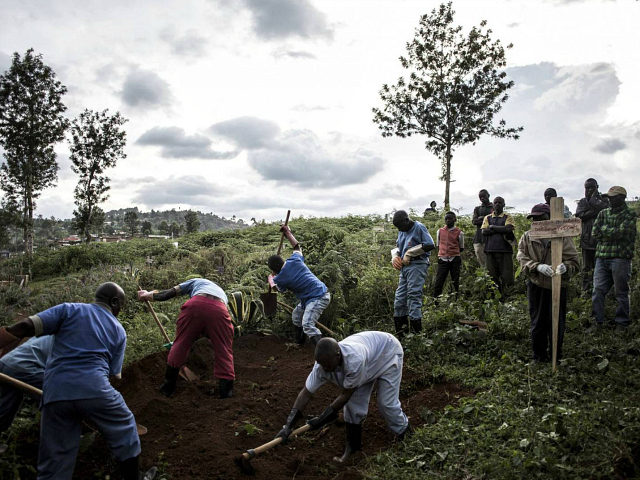Villagers in eastern Democratic Republic of Congo (DRC) reportedly killed a health worker over the weekend who was deployed to combat the African country’s worst-ever Ebola epidemic, and they pillaged the local treatment center where the medic worked.
On Monday, the Agence France-Presse (AFP) news agency learned of the deadly incident from an official health bulletin dated Sunday, which revealed that villagers killed the health worker on Saturday in a remote region in North Kivu province, one of the regions most impacted by a record outbreak of several deadly diseases.
On Monday, the United Nations cautioned that the DRC is reeling from an “unprecedented combination” of epidemics — cholera (10,000 cases; 240 deaths), measles (80,000 cases; 1,400 deaths), and Ebola (1,920 cases; 1,281 deaths) — that have killed nearly 3,000 people this year alone.
“Part of the population of Vusahiro village, in the health sector of Mabalako [North Kivu province], rose up and attacked the local team fighting back against Ebola,” the official bulletin obtained by AFP declared, referring to Saturday’s deadly incident.
“A hygiene agent in the team for the prevention and control of infections died of his injuries during his transfer to the hospital,” health authorities revealed in the report, adding, “The health center in Vusahiro was trashed and looted and three village houses were burned down.”
Health authorities also mentioned a separate incident in which North Kivu residents vandalized an emergency center in the city of Butembo overnight into Sunday.
Since the Ebola outbreak began in August 2018, DRC residents have killed four people and injured dozens of others, including patients, during attacks on health centers, a tally released last Friday by the African country’s health ministry reportedly showed.
Citing the World Health Organization (WHO), the Associated Press (AP) reported on May 3 that “119 attacks have been recorded since January, 42 of them directed at health facilities, while 85 health workers have been wounded or killed.”
“Dozens of rebel groups operate in the region, and political rivalries in part drive’s community rejection of health personnel,” it added.
Insecurity has forced some Ebola doctors to go undercover, the Washington Post reported on May 16, adding:
They mask their identities to avoid harassment and violence in Congo, where the epidemic is spreading at the fastest rate since it started in August — and where misinformation fuels a distrust of outsiders in medical garb. …Fear is changing tactics among aid staffers, who had set out to convince communities that Ebola is real and that they were there to help end it. Now some downplay their mission in public, swapping white coats for street clothes and exchanging SUVs for motorbikes that blend into traffic.
Last year, the U.S. Centers for Disease Control and Prevention (CDC) withdrew its Ebola experts from North Kivu in the wake of an armed group attack against a Congolese military site near where the American team was traveling. Currently, U.S. President Donald Trump’s administration is assessing America’s role in curbing the spread of the disease after sending a delegation to meet Ebola experts on the ground, the Post learned from the U.S. Agency for International Development (USAID).
The health teams fighting the Ebola outbreak are primarily made up of trained villagers working with international medics, AFP pointed out.
Besides the highly infectious hemorrhagic fever associated with the Ebola virus, other deadly diseases are plaguing the DRC, the United Nations reported Monday.
Dr. Seth Berkley, the CEO of the global public-private Vaccine Alliance Gavi, told the U.N.:
The DRC is confronted with an unprecedented combination of deadly epidemics. While the Ebola outbreak continues to cause untold misery in the East, measles and cholera epidemics are claiming the lives of thousands of people throughout the country.
That’s why we are stepping up our response through ongoing measles vaccinations in health zones affected by measles outbreaks, as well as through our continued support for Ebola vaccinations in both the DRC and neighboring countries. We cannot allow this needless suffering to continue.
Locals in the DRC are hostile to preventive measures enforced by international health teams, particularly special high-security protocols imposed for the funerals of Ebola victims that are angering relatives by keeping them at a distance of their loved ones’ bodies for their safety.
The measures, designed to roll back the virus, ban traditional wakes and funerals that once involved relatives and friends seeing and touching the dead body of their loved ones, AFP noted in a different article last week.
“Efforts to tackle the crisis have been hampered both by militia attacks on treatment centers, in which some staff have been killed and by the hostility of some local people to the medical teams,” the news agency reported Monday.
Deteriorating security conditions fueled by jihadis fighting for territory and influence the DRC’s north-eastern neighboring provinces of North Kivu and Ituri, the regions most affected by the Ebola, cholera, and measles epidemics, hinders the implementation of response activities, the World Health Organization (WHO) acknowledged.
Currently, the DRC is facing its largest ever recorded Ebola epidemic — the 10th in the history of the nation where the virus was first observed in 1976 and named after a local river.
The Ebola epidemic plaguing the DRC is the second largest worldwide after an outbreak claimed the lives of more than 11,300 people in West Africa between 2014 and 2016.

COMMENTS
Please let us know if you're having issues with commenting.